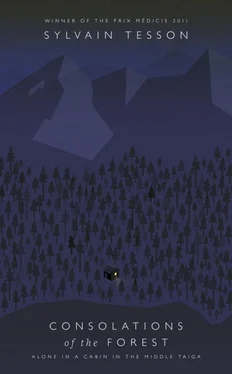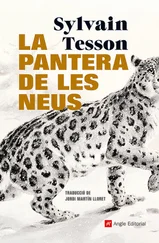The lake is falling asleep, the animals calm. Until three in the morning, we feed the fire, swallow smoked fish, and empty bottles. I would have liked to collapse in the warmth of a cabin. Russia has taught me never to count on the slightest respite after any effort, and always to be prepared to trash myself with vodka after having worn myself out mile after mile.
One of the fishermen, Igor, can’t hold his liquor. He gives off in sobs what he absorbs in ethanol and collapses in my arms blubbering over the child that isn’t on the way. I’ll remember all my life his big tears in a night still echoing with the cries of seagulls. He and his wife have consulted a shaman specializing in fertility and now want to go and stay in Tibetan temples where the power of bodhisattvas could make them fruitful. I don’t dare console him by pointing out that the human anthill is about to explode. And that the French anthropologist Claude Lévi-Strauss described our billions of humans as meal worms in an overcrowded habitat in which we’re killing ourselves with our own toxins. And that the old master, worried about the demographic pressures now afflicting the Earth, had forbidden himself to make ‘any prediction about the future’ – he who’d been born in a world six times less densely populated. And that in his play The Dead Queen , the novelist and playwright Montherlant put these words in the mouth of the king when he discovers that his daughter-in-law is pregnant: ‘My God, will it never end?’ And that tossing an infant into the lions’ cage is not, perhaps, the wisest thing to do. And that the desire to be a father is easily thwarted by maintaining a small fund of pessimism.
9 JUNE
I’d brought along Chateaubriand’s Life of Rancé , about the founder of the Trappists, and I’d planned on spending a pleasant day at Zavorotni with this master of the hermit’s way of life, but feeling guilty about leaving the sun to go on its way alone, I wound up parading my hangover in the noonday sun on the schist slag of the abandoned mine here. Up until the collapse of the Soviet Union, ‘free men’ gutted the mountain in search of microcrystalline quartzite, leaving behind what is known in Russia as a ‘serpentine’, an eighteenth-century French word for a road with hairpin turns. This one is littered with the carcasses of engines and caterpillar excavators. My clothes are in rags, my hair is every which way, I’ve got booze breath and jaundiced eyes, and even the dogs look pitiful, done in by yesterday’s marathon. We all three collapse at regular intervals along the road to recharge ourselves in the sunshine. At an elevation of 3,280 feet, we reach the break in the slope created by the umbilical edge of a glacier long ago. The amphitheatre chewed from the mountain by machines has the dreary look common to all derelict mines. I climb to 6,560 feet, spitting out the scoria of my long night. Up there, the view of the hidden part of the lake is an invitation to adventure. Life is about moving forward, and there’s defeat in retracing one’s steps. We stagger back down through the couloirs of soft snow. Our bodies didn’t need to climb up almost 5,000 feet of crappy roadway today. I ought to have read Chateaubriand while drinking black tea and admiring the ballet of eiders whipping up the good black cream of the lake.
At ten this evening, surrounded by his dogs, V.E. serves me supper in his home, which is more like a kennel than an izba. The floor is sticky with grease, and the stove features huge simmering vats of seal offal and trimmings from elk quarters: dog food. It looks like an athanor, the furnace of an alchemist in eighth-century Lotharingia.
‘So, the mine?’ asks V.E.
‘Very pretty, up there,’ I reply.
‘The dogs?’
‘They followed me, the scamps.’
‘Before, this village was alive, we had a little restaurant. Today, a ruin.’
‘Tovarich, you’re pining for the Soviet Union.’
‘No: nostalgia is pining only for your youth.’
10 JUNE
V.E. serves me braised seal for breakfast. This meat is a nuclear explosion in the mouth that sends its strength all through the body.
‘Comrade,’ I announce, ‘give me some seal, hand me a tank, and leave Poland to me!’
‘That’s not a Russian proverb.’
‘It could be.’
‘Yeah.’
For the moment my friend is feeding his ten dogs with the ingenuity of a wrestler. He has to invade the barking heap with his pail and hurl the rations into the pans while beating back the onslaught of the dogs. Mine are pretty much holding their own in the mêlée. Whoever doesn’t fight doesn’t eat.
On the trip home, I bless the seal meat for giving me its strength. A contrary wind and a heavy chop cost me seven hours of effort to cover about fifteen miles. The dogs wait up for me with short siestas on the smooth boulders. My muscles are in shreds. Dehydration probably has something to do with it. Russia makes its drunks live like athletes. The shore creeps along. Seals keep popping up.
I take a break: a nap ashore with the dogs on the warm rocks, near a fire hot enough to drive spiders from their lairs.
At five I land on my beach just when a trawler arrives to nudge its steel prow among the rocks. The captain asks me if a couple of Dutch passengers may come ashore for a moment.
Erwin works on Sakhalin Island for an oil company. His wife speaks perfect French. The two children are sunburned and better behaved than my dogs. The cabin must seem like a dream to them: Snow White’s cottage, and in it, one of the seven dwarfs. We drink tea in a very civilized way, standing on the beach. They stay fifteen minutes and take a photo, which you would do if you weren’t staying six months.
At the top of the gangplank, Erwin calls out: ‘I’ve got a Herald Tribune , want it?’
‘Sure!’
‘It’s last week’s.’
‘Doesn’t matter.’
He tosses me the paper and it occurs to me that it’s well worth having lived thirty-eight years to have a Batavian guy on a Russian fishing boat deliver the Herald Tribune to me out in the taiga.
The news: little Afghan girls abused by their relatives, then repudiated by their mothers. Women whipped by mullahs (photo). Iraqi Shiites blowing up Sunnis along with a few of their own in the process because homemade IEDs are tricky (photo). The Turks recall their diplomats from Israel (commentary). Iranian atomic scientists crowing over making great strides with their programmes. By page four, I’m thinking I wouldn’t mind staying a few months more out here. The newsprint of the Herald works quite nicely to wrap Siberian fish.
11 JUNE
Rancé is the St Anthony of the temperate latitudes. One of God’s fools minus the sand dunes and scorpions. It’s the seventeenth century: a man of wealth and distinction decides to die to the world. At the age of thirty-seven, he sets a new course for the wilderness ‘without memory and without resentment’. Chateaubriand paints a frightening portrait of Rancé. Giving no warning, he leaves his gilded halls, renouncing his aristocratic life for one of penitence. Taking the Gospels literally, he pays his debt to the poor and then, in the hills of Perche in northern France, founds l’ordre de La Trappe , a congregation of deadly serious discipline, a ‘Christian Sparta’. In his retreat, he prays, writes, meditates and mortifies his sick body. He will live thirty-seven more years in solitude, crippled by suffering, cloistered in the ‘desolation’ of stones. Thirty-seven years of pleasure against thirty-seven years of silence: a loan redeemed. With the maniacal exactitude of an accountant, Rancé will repay the debt he owed the devil, drawing ‘his last strength from his first weakness’. In a letter to the Bishop of Tournai, he sums everything up: ‘We live to die.’
Читать дальше












